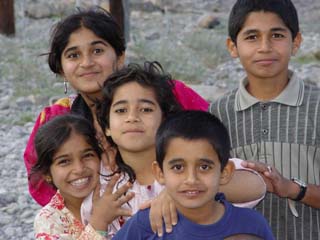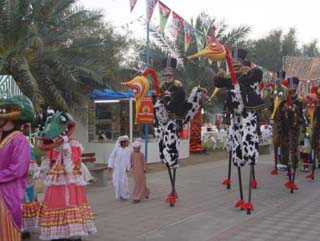|
Delegates from More than 40 Countries Contribute to “Bridging the North-South Divide through Delegates from more than 40 countries took part in the 1st IIPT European Conference: “Bridging the North –South Divide through Sustainable Tourism Development” organized by IIPT in partnership with the U.N. World Tourism Organization (UNWTO) and the U.N. Environment Program (UNEP) and hosted by Stenden University. The Conference, held in Leeuwarden, Netherlands, 21-24 October 2008, was in support of the U.N. Decade of Peace and Non-Violence for the Children of the World and the U.N. Millennium Development Goals. The exponential growth of international tourism arrivals from 25 million
in 1950 to a projected 1 billion in 2010 is clearly one of the most
remarkable economic and social phenomena of our time. An increasing
proportion of
these arrivals are in Developing Countries. Travel and tourism is currently
the main source of foreign exchange for most developing countries and
at US$ 200 billion annually is more than the total of foreign aid from
all governments. Tourism appears to be one of the few economic sectors
able to guide a number of developing countries to higher levels of
prosperity and for some to leave behind their least developed country
status.
Both IIPT and Stenden University were gratified by the high quality of presentations during the Conference and the enthusiastic participation of some 200 delegates.
The Conference brought together Ministers of Tourism and senior executives from both the public and private sectors of tourism, European Union, U.N. Agencies, foundations, donor agencies, and NGOs, as well as educators, policy analysts, leading practitioners, entrepreneurs, future leaders of the industry, and senior representatives of related sectors including environment, culture, sport, and sustainable economic development. Hightlights of Opening Ceremony
Hon. Edmund Bartlett Plenary Session I: Global Perspectives
Hon. Gil da Costa Alves, Minister for Tourism, East-Timor, discussed the challenges facing East-Timor and the priority given to sustainable tourism with an emphasis on the importance of providing environmental and cultural safeguards ensuring that benefits accrue to local citizens. Hon.Netumbo Nandi-Ndaitwah, Minister of Environment and Tourism, Namibia, spoke of the importance of tourism in achieving a more balanced image of Africa as well as reducing poverty, healing wounds of conflict and establishing peace. Namibia’s Nature Conservation Amendment Act of 1996 through which control, ownership, and use of plant and animal wildlife is given to communal area residents allowing communities to achieve economic benefits from the natural resources of the country. Kathy Sudeikis, Past President, American Society of Travel Agents (ASTA) and U.S. Travel Agent of the Year, spoke of the emphasis ASTA is placing on the environment and sustainable tourism through the ASTA Green Member Program. She emphasized the importance of educating travelers and providing ‘green’ options and the importance of travel as a catalyst of positive change, through the building of relationships, experience and understanding.
Plenary Session II: Achieving a Greater Societal ROI Dr. Vassilis Morfopoulos, Managing Director, Basic International Development Corp. (BIDC), spoke of the collateral benefits of tourism in developing and emerging economies including: economic diversification - infrastructure - education - public health - environmental conservation - cultural invigoration - development of social institutions that maximize the benefits of tourism - and the projection of host country and its culture on the world stage. Mr. John Hummel introduced delegates to SNV Netherlands Development
Organisation, and its role of poverty reduction through partnerships
in tourism, illustrating the impacts of pro-poor tourism, market-based
solutions and multi-stakeholder collaborations.
Plenary Session III: Social, Cultural and Sports Dimensions Dr. Ginger Smith, Robert Tisch Center for Hospitality, Tourism, and Sports Management presented a moving presentation on the value of sports – the Special Olympics – and its promotion of international dialogue and advancement of world peace. She said, “The support of and participation in sports can transcend political, socio-cultural, and economic barriers globally ….. as spectators and athletes come together on a larger scale than ever before.” Mr. Abdul-Sahib Shakiri, Editor and Puablisher, Islamic Tourism Magazine spoke of the important role of tourism in facilitating dialogue and understanding among persons of different faiths and cultures and the communication role that the Islamic Tourism Magazine plays towards this end. Mr. Shakiri also spoke of his role in various charitable organizations and as well the Iraqi Charities Forum which he founded.
Plenary Session IV: More Effective Models of Collaboration Senator Afikuyomi spoke of the importance of tourism as an instrument of economic development – but that there was a need in Western Africa overall vision for tourism in and proceeded to outline issues facing Western Africa including the lack of direct air service; marketing, inadequate infrastructure, need for training, and “technical know-how,” strategic planning, and investment. These are all areas that can be improved through North – South and South-South collaboration. Luigi Cabrini, Director, Sustainable Development, U.N. World Tourism Organization, emphasized the key role that tourism plays in poverty reduction, providing insight and specific examples of tourism’s contribution to poverty reduction and the needs of developing countries. Mr. Cabrini also outlined the specific initiatives and policies of the UN WTO including the ST-EP Program (Sustainable Tourism – Eliminating Poverty). Janos Damon, Executive Director, Israel Hotel Managers Association and
Founder, Tourism 4 Peace, stated that, “War is the enemy of tourism,
but despite the conflicts and wars in the Middle East, tourism remains
an important economic sector. Cooperation is required among Middle Eastern
countries in a way tourism can be a catalyst for peace.
Media Luncheon Plenary Session V: Educational Foundations Dr. Myriam Jansen-Verbeke, Leuven University, Belgium, emphasized the importance of integrating cultural resources and intangible heritage into the tourism product and suggested several areas for research regarding the relationship of peace – tourism – and the characteristics of destinations. Dr. Irena Ateljevic, Wageningen University, Netherlands presented her
analysis of current literature regarding trends in a global paradigm
shift towards a new era of humanity wherein there is an increased search
for meaning in life and this paradigm shift is also shaping tourism,
which in many respects is the most visible indicator of this shift towards
“global citizenship.”
Concurrent Sessions The concurrent session presentations by more than seventy leading practitioners and educators allowed participants to learn about current research and projects being conducted across all spectrums and countries. Presenters discussed tourism for peace perspectives in the countries of Australia, Russia, Nepal, Tanzania, Egypt, Cyprus, Israel, Nigeria, Senegal, Morocco, Mexico, Bosnia and Jamaica and other regions and countries of the world. Additionally, many presentations focused on the broader scope of tourism on certain industries; for example, the promotion of renewable energies toward sustainable tourism and specific models of poverty reduction. The scope of knowledge, experience, and specific case studies of ‘Success Stories’ and ‘Models of Best Practice’ provided participants a wide perspective of the issues pertaining to sustainable tourism development and in particular – the potential for poverty reduction and societal betterment in countries in developing countries through North - South and South – South collaboration.
Thank you again! The 1st IIPT European Conference built on the foundations of three Global Conferences: Vancouver, Canada 1988; Montreal, Canada 1994; Glasgow, Scotland, 1999; three Global Summits in Amman, Jordan 2000, Geneva, Switzerland 2003; and Pattaya, Thailand 2005; four African Conferences: Mpumalanga Province, South Africa 2001; Dar es Salaam, Tanzania 2003; Lusaka, Zambia 2005; and Kampala, Uganda 2007; and other conferences and symposia in Italy, Turkey, Greece, Australia, the Caribbean, Pakistan, Israel, United States, and United Kingdom. Web Resource |
|||||||||||||||||||
IIPT FEATURED AT WORLD TRAVEL MARKET The International Institute for Peace through Tourism (IIPT) was again featured at World Travel Market on November 11th with a theme of: Peace through Tourism: The Next Twenty Years The November 11th date was particularly significant together with the symbolism of the 11th hour, of the 11th day, of the 11th month as it was the precise 90th anniversary of the end of World War I – the “War to end all wars.” Nine million people were killed in what has been called the “Great War.” Yet, as history has shown, another 100 million people were killed in the remaining 82 years of the 20th century as a result of conflict – most of them innocent men, women and children. We have begun this 21st Century with conflict that has now gone on longer than that first “Great War.” The event began with a brief video featuring “Voices of the first 20 years” that included President Ronald Reagan and Pope John Paul II, both of whom sent video-taped messages to the 1st IIPT Global Conference in Vancouver, 1988; Kind Abdullah II, Patron of the 1st Global Summit, Amman 2000; Harvey Golub, Chairman, American Express and World Travel & Tourism Council and others.
Featured speakers who shared their insights, ideas, ideals – and vision on tourism’s contribution to peace in the next 20 years included: Ms. Fiona Jeffery, Chair, World Travel Market: Dr. Dawid de Villiers, Chairman, UN World Tourism Organization Strategic Group, and Special Adviser to the UNWTO Secretary-General on Ethical Matters; Ms. Janice Antonson, Chair, Pacific Asia Travel Association (PATA); Mr. Chris Russo, President and CEO, American Society of Travel Agents (ASTA); Ms. Michele McKenzie, Chair, Canadian Tourism Commission (CTC); Mr. Dennis Castleman, Vice President, Inter-governmental Affairs, Travel Industry Association of America (TIA); Ms. Hulya Aslantas, President, SKAL International; David Jones, Director General, World Youth, Student & Educational Travel Confederation (WYSE TC); Mr. Birger Bäckman, Senior Advisor, United Federation of Travel Agents’ Associations (UFTAA).
I Peace through Tourism: The Next Twenty Years As well, November 8-11 was the precise 8th Anniversary
of IIPT’s 1st Global Summit on Peace though Tourism, Amman 2000 and launch of the
IIPT Global Peace Parks Program from Bethany Beyond the Jordan, site
of Christ’s baptism, precisely on the 11th hour, of the 11th day, of
the 11th month, in the 1st year of the new Millennium.
|
|||||||||||||||||||
"PEACE THROUGH COMMERCE" CONFERENCE EXPANDS MULTI-SECTOR COLLABORATION IIPT was proud to again partner
with George Washington University’s Institute of Corporate Responsibility
(ICR) as well
as FLOW, an organization dedicated to creating sustainable peace
through
entrepreneurial spirit, and other leading organizations for a three-day "Peace
Through Commerce" conference at George Washington University
from November 13 to 15.
|
|||||||||||||||||||
IIPT President Addresses Iran Tourism Conference IIPT Founder and President Louis D’Amore this past week addressed delegates from 48 countries at the 1st International Tour Operators Conference in Tehran. The aim of the historic conference was to familiarize the high level delegates with Iran’s tourism attractions and to explore possibilities of strengthening ties through tourism. Mr. D’Amore began his address acknowledging Iran as one of the world's
oldest continuous civilizations, with historical and urban settlements
dating back to 4000 BC and a land rich in history, science and technology,
the arts, literature and culture. He suggested that with two thirds
of its population under 25, Iran was a country with a great future. While President Khatami’s vision has had setbacks in the first years of the 21st century, Mr. D’Amore suggested there was now an opportunity to begin the dialogue anew – with travel and tourism playing a key role in its fulfillment. He stated that “Humanity is currently witnessing - and shaping, the most rapid and significant paradigm shift in human history – a paradigm shift of major demographic, economic, ecological and geo-political dimensions.” Mr. D’Amore briefly outlined the challenges of an exploding population – 90% of which is in developing countries; persistent poverty in certain regions of the world; ecological decline and climate change; economic disparities and the current economic crisis. “To meet the challenges of the unprecedented global issues facing our one common home – and our one common future as a global family,” Mr. D’Amore stated, “would require a a global family at peace with itself – and a paradigm shift to collaboration at all levels, and by all sectors of society.” “This human journey of collaboration can only begin by first building bridges of understanding between civilizations, cultures and religions.” “Towards this end,” Mr. D’Amore concluded, “IIPT would give serious consideration to holding a conference in Iran with the aim of promoting “A Dialogue Among Civilizations through Tourism” in support of the 1998 proposal of President Khatami. For the full text of Mr. D’Amore’s address, please click
here.
|
|||||||||||||||||||

2009 World Peace Tours Announced
For specific information about these itineraries Please click here Travel agents are invited to collaborate with IIPT in promoting these tours to their clients and to earn commissions from sale of the tours. King says, “This will be an opportunity for agents to earn a commission and also help promote conscientious tourism. We would like to enlist travel agents’ assistance as we continue efforts to make travel and tourism the world’s first global peace industry.”
|
|||||||||||||||||||
About IIPT The International Institute for Peace through Tourism (IIPT) is a not for profit organization dedicated to fostering travel and tourism initiatives that contribute to international understanding and cooperation, an improved quality of environment, the preservation of heritage, and poverty reduction; and through these initiatives, helping to bring about a peaceful and sustainable world. It is founded on a vision of the world’s largest industry, travel and tourism – becoming the world’s first global peace industry; and the belief that every traveler is potentially an “Ambassador for Peace.” For more information: |
|||||||||||||||||||
|
eTurboNews
is
proud to be the sponsor for this IIPT
Newsletter |

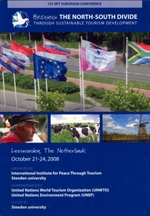 The aim of the 1st IIPT European Conference was
to build on this success, and to leverage current North – South, and
South – South initiatives towards sustainable tourism development,
poverty reduction, and societal betterment through greater collaboration
among key stakeholders.
The aim of the 1st IIPT European Conference was
to build on this success, and to leverage current North – South, and
South – South initiatives towards sustainable tourism development,
poverty reduction, and societal betterment through greater collaboration
among key stakeholders.
 The
Opening Ceremony Keynote address was delivered by Ms. Patricia Samuels,
Attache, Tourism and Culture, on behalf of Hon. Edmund Bartlett, Minister
of Tourism, Jamaica. His presentation focused on the “Spruce Up Jamaica”
Campaign – a strategy for sustainable tourism development based on
developing human resources and talents and instilling a sense of pride
among all Jamaicans.
The
Opening Ceremony Keynote address was delivered by Ms. Patricia Samuels,
Attache, Tourism and Culture, on behalf of Hon. Edmund Bartlett, Minister
of Tourism, Jamaica. His presentation focused on the “Spruce Up Jamaica”
Campaign – a strategy for sustainable tourism development based on
developing human resources and talents and instilling a sense of pride
among all Jamaicans.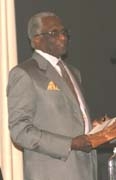 Dr. Noel Brown, Chairman, IIPT International
Advisory Board, and President, Friends of the United Nations, moderated
the 1st Plenary Session, “Global Perspectives on Bridging the North
– South Divide: Sustainable Tourism Development and the U.N Millennium
Development Goals.” Dr. Brown also Moderated two additional plenary
sessions of the conference, adding his comments and perspectives as
well to those of the distinguished Keynote Speakers in each session.
Dr. Noel Brown, Chairman, IIPT International
Advisory Board, and President, Friends of the United Nations, moderated
the 1st Plenary Session, “Global Perspectives on Bridging the North
– South Divide: Sustainable Tourism Development and the U.N Millennium
Development Goals.” Dr. Brown also Moderated two additional plenary
sessions of the conference, adding his comments and perspectives as
well to those of the distinguished Keynote Speakers in each session. 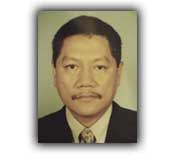
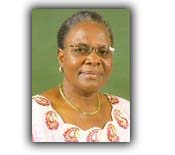

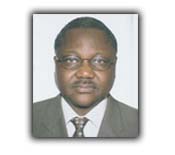
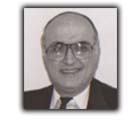


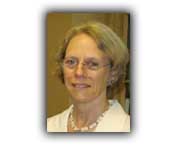
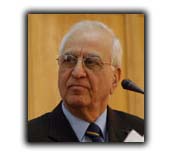

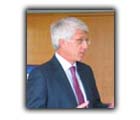
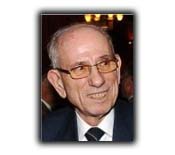
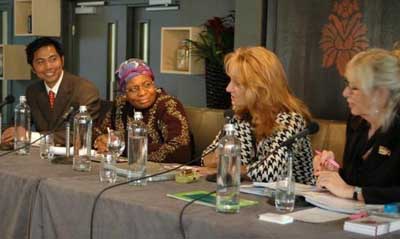



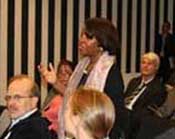

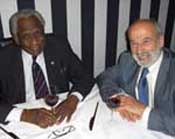
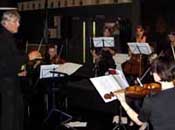


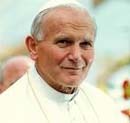
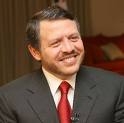
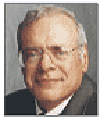









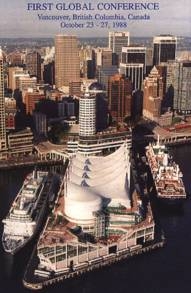 IPT 20th Anniversary
IPT 20th Anniversary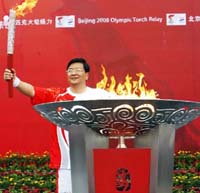
 Support for Olympic Truce Leading up to 2010 Winter Olympics
Support for Olympic Truce Leading up to 2010 Winter Olympics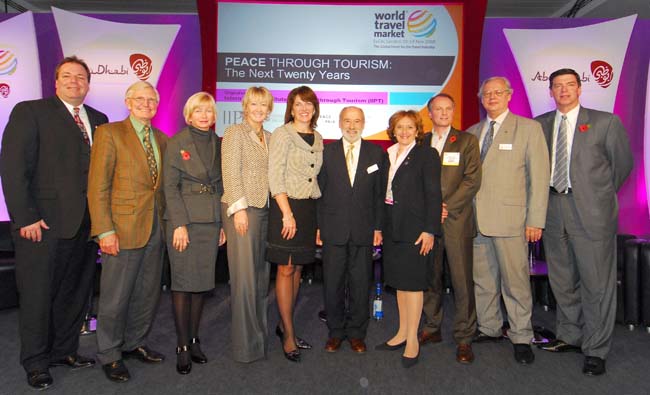




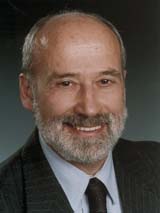
 Keynote speaker Steven Killelea, Global
Peace Index (GPI) founder and Australian entrepreneur and philanthropist
provided research demonstrating that per capita gross domestic product
correlates strongly with peacefulness, and peace can be correlated
with a company's international business activities. For every 10 places
along the GPI, per capita income increases by approximately US$3,000,
and retail expenditures increase in line with per capita income.
Keynote speaker Steven Killelea, Global
Peace Index (GPI) founder and Australian entrepreneur and philanthropist
provided research demonstrating that per capita gross domestic product
correlates strongly with peacefulness, and peace can be correlated
with a company's international business activities. For every 10 places
along the GPI, per capita income increases by approximately US$3,000,
and retail expenditures increase in line with per capita income.  Walter Robb, President and
Chief Operating Officer of Whole Foods Market, said, "Commerce
plays an essential role in security, as efforts to promote economic
freedom reap measurable rewards
of peace and profits. The business sector must embrace a leadership
role in promoting peace through economic opportunity, leading to new
products, markets, and a world of possibility."
Walter Robb, President and
Chief Operating Officer of Whole Foods Market, said, "Commerce
plays an essential role in security, as efforts to promote economic
freedom reap measurable rewards
of peace and profits. The business sector must embrace a leadership
role in promoting peace through economic opportunity, leading to new
products, markets, and a world of possibility."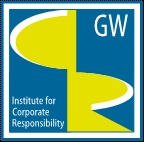







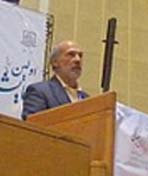 Mr. D’Amore recalled that ten years earlier, in 1998, then Iranian
President Khatami – proposed “A Dialogue of Civilizations” with the
aim of leaving behind a century of inequality, violence, and conflict,
and with the intent of benefitting from the achievements and experiences
of all civilizations to begin a new century of humanity, understanding,
and durable peace. President Khatami’s proposal was subsequently
adopted by the United Nations as the UN International Year for a
Dialogue Among Civilizations 2001.
Mr. D’Amore recalled that ten years earlier, in 1998, then Iranian
President Khatami – proposed “A Dialogue of Civilizations” with the
aim of leaving behind a century of inequality, violence, and conflict,
and with the intent of benefitting from the achievements and experiences
of all civilizations to begin a new century of humanity, understanding,
and durable peace. President Khatami’s proposal was subsequently
adopted by the United Nations as the UN International Year for a
Dialogue Among Civilizations 2001.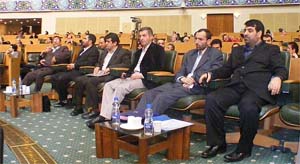
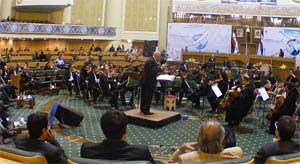
 The
International Institute for Peace through Tourism is most pleased
to announce its World Peace Tours Program for 2009 with 8 exciting
tours to different regions of the world. The tours were recently
highlighted at TheTradeShow in Orlando building on the recent partnership
agreement between ASTA and IIPT.
The
International Institute for Peace through Tourism is most pleased
to announce its World Peace Tours Program for 2009 with 8 exciting
tours to different regions of the world. The tours were recently
highlighted at TheTradeShow in Orlando building on the recent partnership
agreement between ASTA and IIPT. 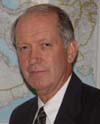 Lou
D’Amore, the president of IIPT has asked Donald King, who serves
as Ambassador at Large for IIPT, to provide leadership to the World
Peace Tours initiative. King says, “Our first World Peace Tours—to
Oman and to Bhutan--proved successful in achieving the goals of IIPT,
and exhibiting at TheTradeShow has been a positive experience in
helping us as we expand our tour offerings.”
Lou
D’Amore, the president of IIPT has asked Donald King, who serves
as Ambassador at Large for IIPT, to provide leadership to the World
Peace Tours initiative. King says, “Our first World Peace Tours—to
Oman and to Bhutan--proved successful in achieving the goals of IIPT,
and exhibiting at TheTradeShow has been a positive experience in
helping us as we expand our tour offerings.”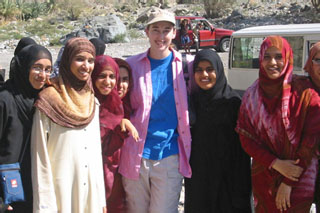 Seven
tours for 2009 have currently been designated as “World Peace
Tours”:
Seven
tours for 2009 have currently been designated as “World Peace
Tours”: